Leadership and Management for Service Industries
VerifiedAdded on 2023/01/10
|17
|4251
|91
AI Summary
Contribute Materials
Your contribution can guide someone’s learning journey. Share your
documents today.
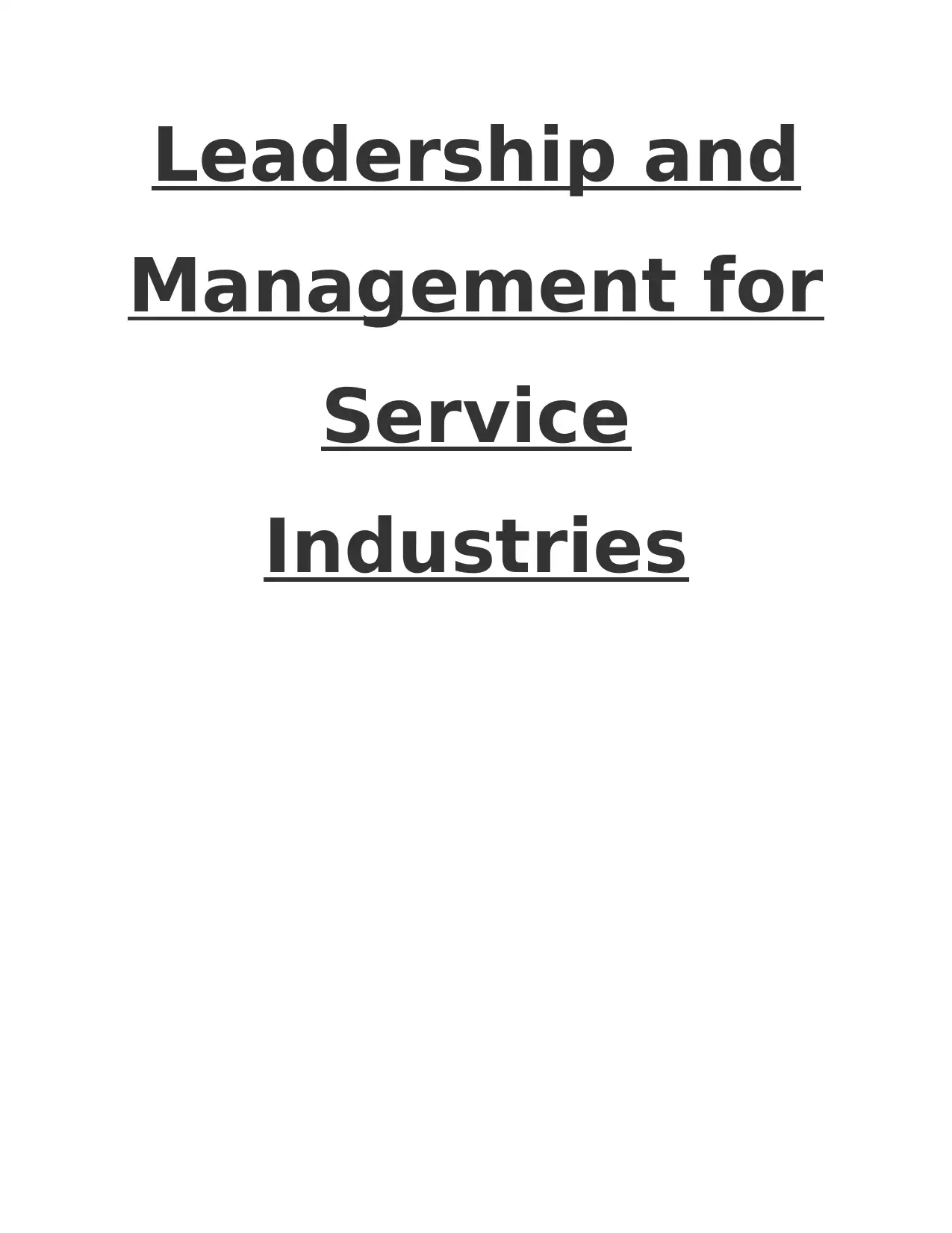
Leadership and
Management for
Service
Industries
Management for
Service
Industries
Secure Best Marks with AI Grader
Need help grading? Try our AI Grader for instant feedback on your assignments.
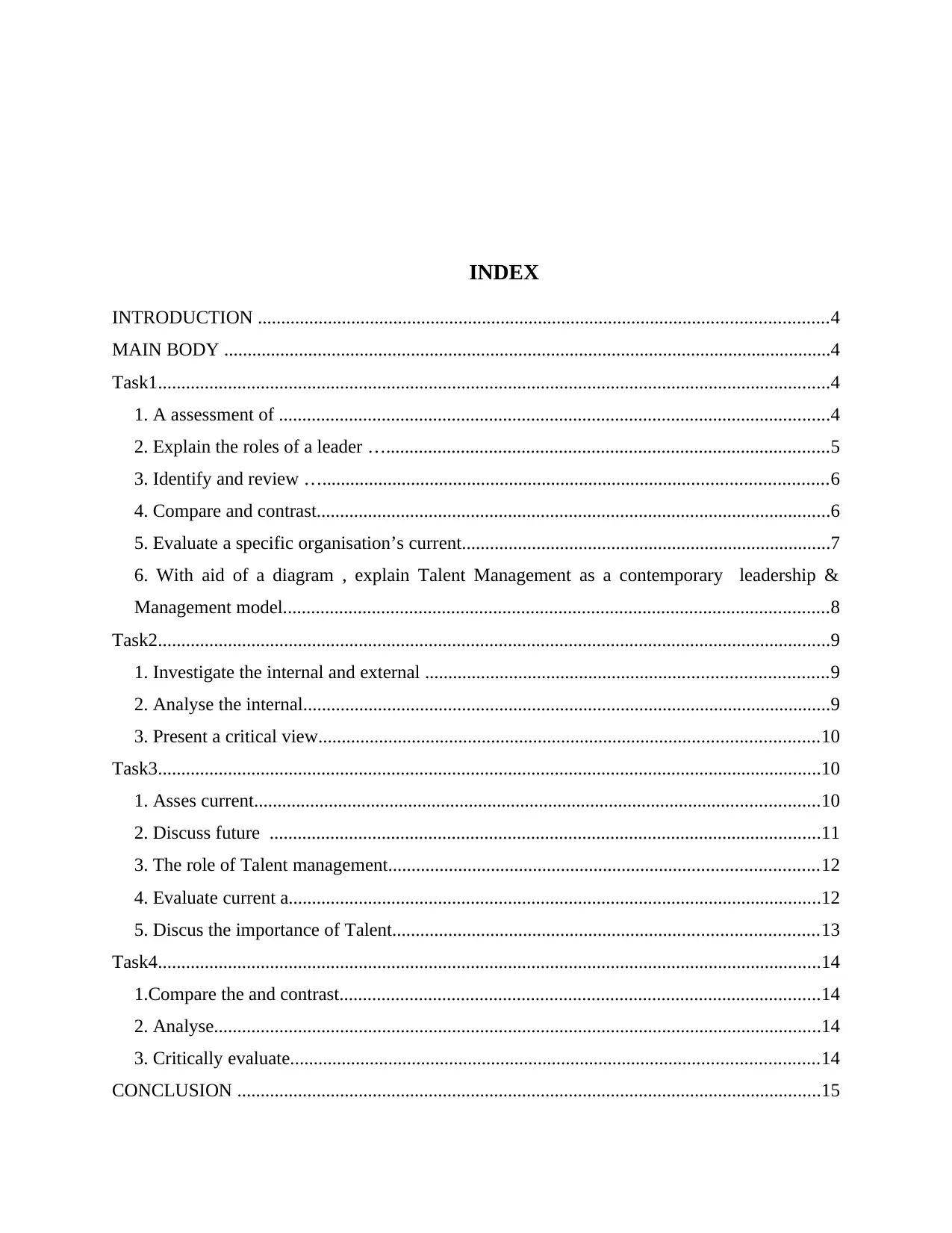
INDEX
INTRODUCTION ..........................................................................................................................4
MAIN BODY ..................................................................................................................................4
Task1................................................................................................................................................4
1. A assessment of ......................................................................................................................4
2. Explain the roles of a leader …...............................................................................................5
3. Identify and review …............................................................................................................6
4. Compare and contrast..............................................................................................................6
5. Evaluate a specific organisation’s current...............................................................................7
6. With aid of a diagram , explain Talent Management as a contemporary leadership &
Management model.....................................................................................................................8
Task2................................................................................................................................................9
1. Investigate the internal and external ......................................................................................9
2. Analyse the internal.................................................................................................................9
3. Present a critical view...........................................................................................................10
Task3..............................................................................................................................................10
1. Asses current.........................................................................................................................10
2. Discuss future ......................................................................................................................11
3. The role of Talent management............................................................................................12
4. Evaluate current a..................................................................................................................12
5. Discus the importance of Talent...........................................................................................13
Task4..............................................................................................................................................14
1.Compare the and contrast.......................................................................................................14
2. Analyse..................................................................................................................................14
3. Critically evaluate.................................................................................................................14
CONCLUSION .............................................................................................................................15
INTRODUCTION ..........................................................................................................................4
MAIN BODY ..................................................................................................................................4
Task1................................................................................................................................................4
1. A assessment of ......................................................................................................................4
2. Explain the roles of a leader …...............................................................................................5
3. Identify and review …............................................................................................................6
4. Compare and contrast..............................................................................................................6
5. Evaluate a specific organisation’s current...............................................................................7
6. With aid of a diagram , explain Talent Management as a contemporary leadership &
Management model.....................................................................................................................8
Task2................................................................................................................................................9
1. Investigate the internal and external ......................................................................................9
2. Analyse the internal.................................................................................................................9
3. Present a critical view...........................................................................................................10
Task3..............................................................................................................................................10
1. Asses current.........................................................................................................................10
2. Discuss future ......................................................................................................................11
3. The role of Talent management............................................................................................12
4. Evaluate current a..................................................................................................................12
5. Discus the importance of Talent...........................................................................................13
Task4..............................................................................................................................................14
1.Compare the and contrast.......................................................................................................14
2. Analyse..................................................................................................................................14
3. Critically evaluate.................................................................................................................14
CONCLUSION .............................................................................................................................15
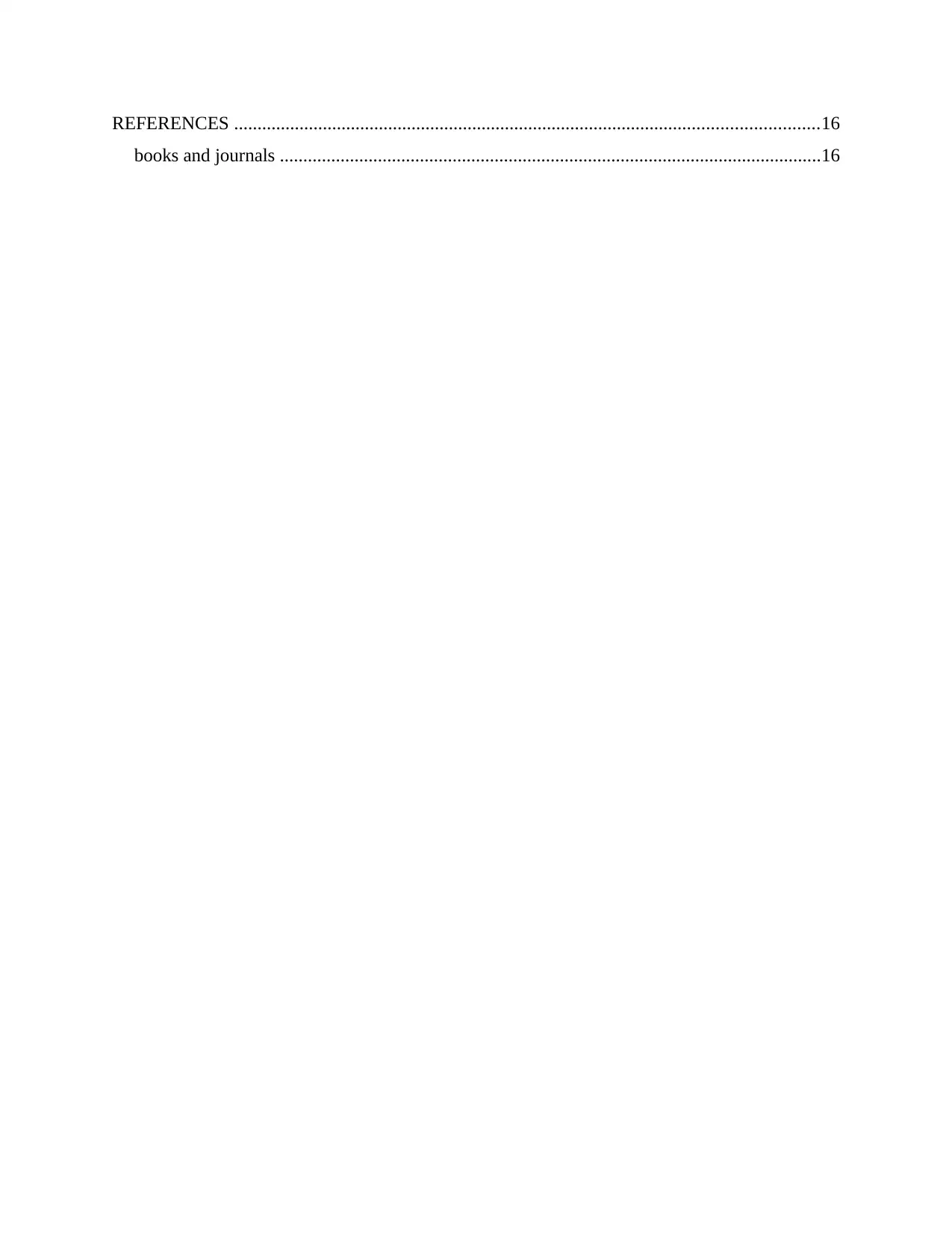
REFERENCES .............................................................................................................................16
books and journals ....................................................................................................................16
books and journals ....................................................................................................................16
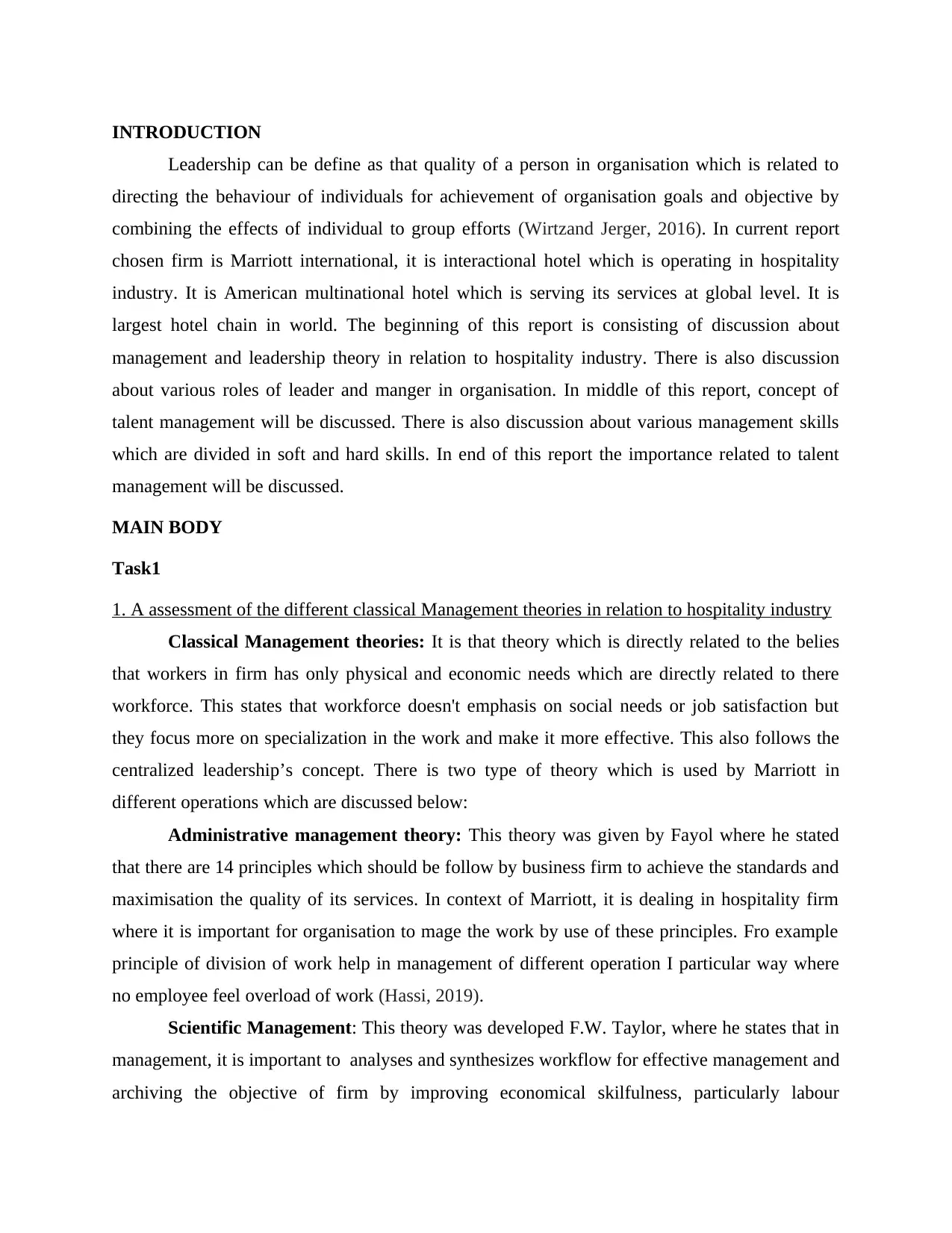
INTRODUCTION
Leadership can be define as that quality of a person in organisation which is related to
directing the behaviour of individuals for achievement of organisation goals and objective by
combining the effects of individual to group efforts (Wirtzand Jerger, 2016). In current report
chosen firm is Marriott international, it is interactional hotel which is operating in hospitality
industry. It is American multinational hotel which is serving its services at global level. It is
largest hotel chain in world. The beginning of this report is consisting of discussion about
management and leadership theory in relation to hospitality industry. There is also discussion
about various roles of leader and manger in organisation. In middle of this report, concept of
talent management will be discussed. There is also discussion about various management skills
which are divided in soft and hard skills. In end of this report the importance related to talent
management will be discussed.
MAIN BODY
Task1
1. A assessment of the different classical Management theories in relation to hospitality industry
Classical Management theories: It is that theory which is directly related to the belies
that workers in firm has only physical and economic needs which are directly related to there
workforce. This states that workforce doesn't emphasis on social needs or job satisfaction but
they focus more on specialization in the work and make it more effective. This also follows the
centralized leadership’s concept. There is two type of theory which is used by Marriott in
different operations which are discussed below:
Administrative management theory: This theory was given by Fayol where he stated
that there are 14 principles which should be follow by business firm to achieve the standards and
maximisation the quality of its services. In context of Marriott, it is dealing in hospitality firm
where it is important for organisation to mage the work by use of these principles. Fro example
principle of division of work help in management of different operation I particular way where
no employee feel overload of work (Hassi, 2019).
Scientific Management: This theory was developed F.W. Taylor, where he states that in
management, it is important to analyses and synthesizes workflow for effective management and
archiving the objective of firm by improving economical skilfulness, particularly labour
Leadership can be define as that quality of a person in organisation which is related to
directing the behaviour of individuals for achievement of organisation goals and objective by
combining the effects of individual to group efforts (Wirtzand Jerger, 2016). In current report
chosen firm is Marriott international, it is interactional hotel which is operating in hospitality
industry. It is American multinational hotel which is serving its services at global level. It is
largest hotel chain in world. The beginning of this report is consisting of discussion about
management and leadership theory in relation to hospitality industry. There is also discussion
about various roles of leader and manger in organisation. In middle of this report, concept of
talent management will be discussed. There is also discussion about various management skills
which are divided in soft and hard skills. In end of this report the importance related to talent
management will be discussed.
MAIN BODY
Task1
1. A assessment of the different classical Management theories in relation to hospitality industry
Classical Management theories: It is that theory which is directly related to the belies
that workers in firm has only physical and economic needs which are directly related to there
workforce. This states that workforce doesn't emphasis on social needs or job satisfaction but
they focus more on specialization in the work and make it more effective. This also follows the
centralized leadership’s concept. There is two type of theory which is used by Marriott in
different operations which are discussed below:
Administrative management theory: This theory was given by Fayol where he stated
that there are 14 principles which should be follow by business firm to achieve the standards and
maximisation the quality of its services. In context of Marriott, it is dealing in hospitality firm
where it is important for organisation to mage the work by use of these principles. Fro example
principle of division of work help in management of different operation I particular way where
no employee feel overload of work (Hassi, 2019).
Scientific Management: This theory was developed F.W. Taylor, where he states that in
management, it is important to analyses and synthesizes workflow for effective management and
archiving the objective of firm by improving economical skilfulness, particularly labour
Secure Best Marks with AI Grader
Need help grading? Try our AI Grader for instant feedback on your assignments.
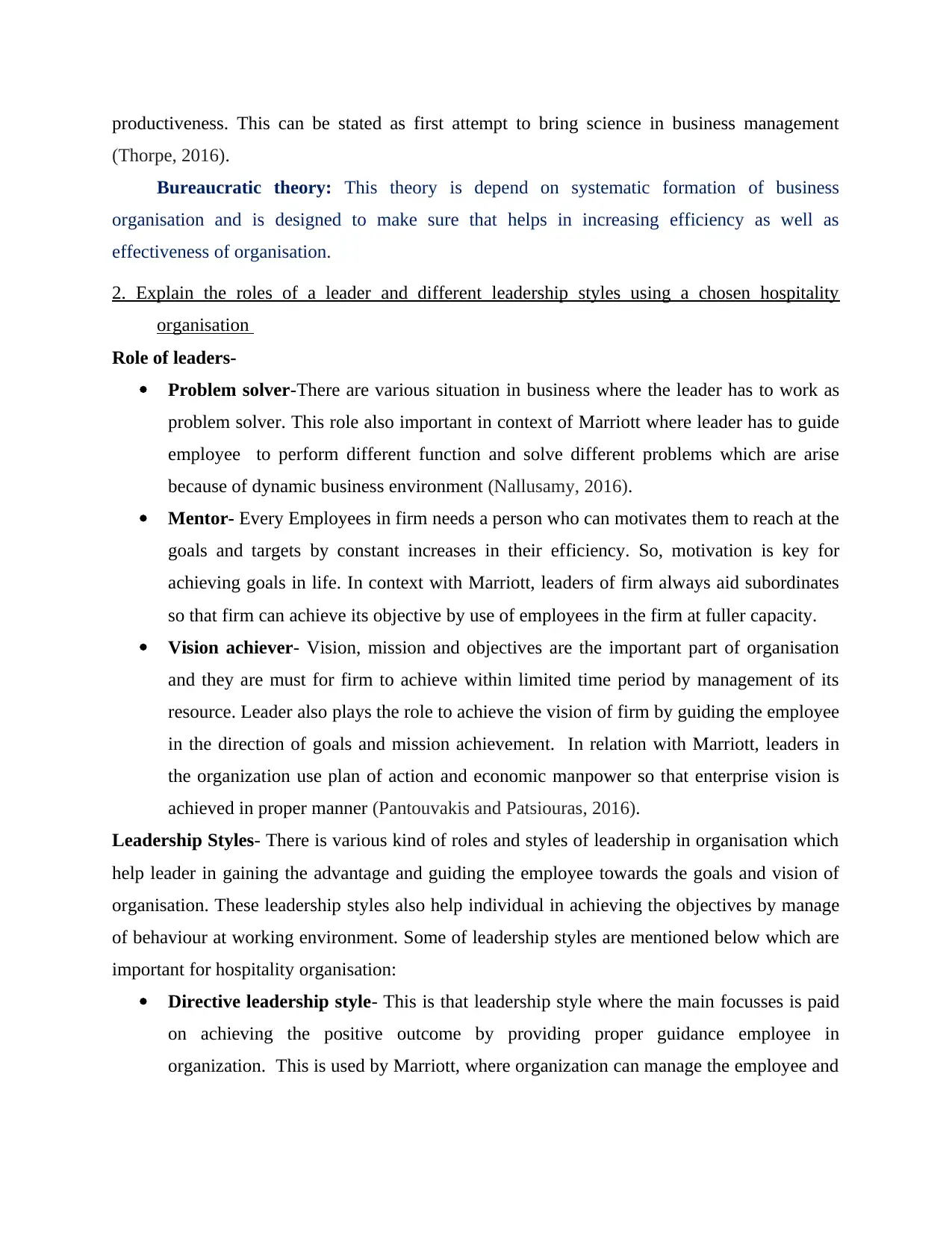
productiveness. This can be stated as first attempt to bring science in business management
(Thorpe, 2016).
Bureaucratic theory: This theory is depend on systematic formation of business
organisation and is designed to make sure that helps in increasing efficiency as well as
effectiveness of organisation.
2. Explain the roles of a leader and different leadership styles using a chosen hospitality
organisation
Role of leaders-
Problem solver-There are various situation in business where the leader has to work as
problem solver. This role also important in context of Marriott where leader has to guide
employee to perform different function and solve different problems which are arise
because of dynamic business environment (Nallusamy, 2016).
Mentor- Every Employees in firm needs a person who can motivates them to reach at the
goals and targets by constant increases in their efficiency. So, motivation is key for
achieving goals in life. In context with Marriott, leaders of firm always aid subordinates
so that firm can achieve its objective by use of employees in the firm at fuller capacity.
Vision achiever- Vision, mission and objectives are the important part of organisation
and they are must for firm to achieve within limited time period by management of its
resource. Leader also plays the role to achieve the vision of firm by guiding the employee
in the direction of goals and mission achievement. In relation with Marriott, leaders in
the organization use plan of action and economic manpower so that enterprise vision is
achieved in proper manner (Pantouvakis and Patsiouras, 2016).
Leadership Styles- There is various kind of roles and styles of leadership in organisation which
help leader in gaining the advantage and guiding the employee towards the goals and vision of
organisation. These leadership styles also help individual in achieving the objectives by manage
of behaviour at working environment. Some of leadership styles are mentioned below which are
important for hospitality organisation:
Directive leadership style- This is that leadership style where the main focusses is paid
on achieving the positive outcome by providing proper guidance employee in
organization. This is used by Marriott, where organization can manage the employee and
(Thorpe, 2016).
Bureaucratic theory: This theory is depend on systematic formation of business
organisation and is designed to make sure that helps in increasing efficiency as well as
effectiveness of organisation.
2. Explain the roles of a leader and different leadership styles using a chosen hospitality
organisation
Role of leaders-
Problem solver-There are various situation in business where the leader has to work as
problem solver. This role also important in context of Marriott where leader has to guide
employee to perform different function and solve different problems which are arise
because of dynamic business environment (Nallusamy, 2016).
Mentor- Every Employees in firm needs a person who can motivates them to reach at the
goals and targets by constant increases in their efficiency. So, motivation is key for
achieving goals in life. In context with Marriott, leaders of firm always aid subordinates
so that firm can achieve its objective by use of employees in the firm at fuller capacity.
Vision achiever- Vision, mission and objectives are the important part of organisation
and they are must for firm to achieve within limited time period by management of its
resource. Leader also plays the role to achieve the vision of firm by guiding the employee
in the direction of goals and mission achievement. In relation with Marriott, leaders in
the organization use plan of action and economic manpower so that enterprise vision is
achieved in proper manner (Pantouvakis and Patsiouras, 2016).
Leadership Styles- There is various kind of roles and styles of leadership in organisation which
help leader in gaining the advantage and guiding the employee towards the goals and vision of
organisation. These leadership styles also help individual in achieving the objectives by manage
of behaviour at working environment. Some of leadership styles are mentioned below which are
important for hospitality organisation:
Directive leadership style- This is that leadership style where the main focusses is paid
on achieving the positive outcome by providing proper guidance employee in
organization. This is used by Marriott, where organization can manage the employee and
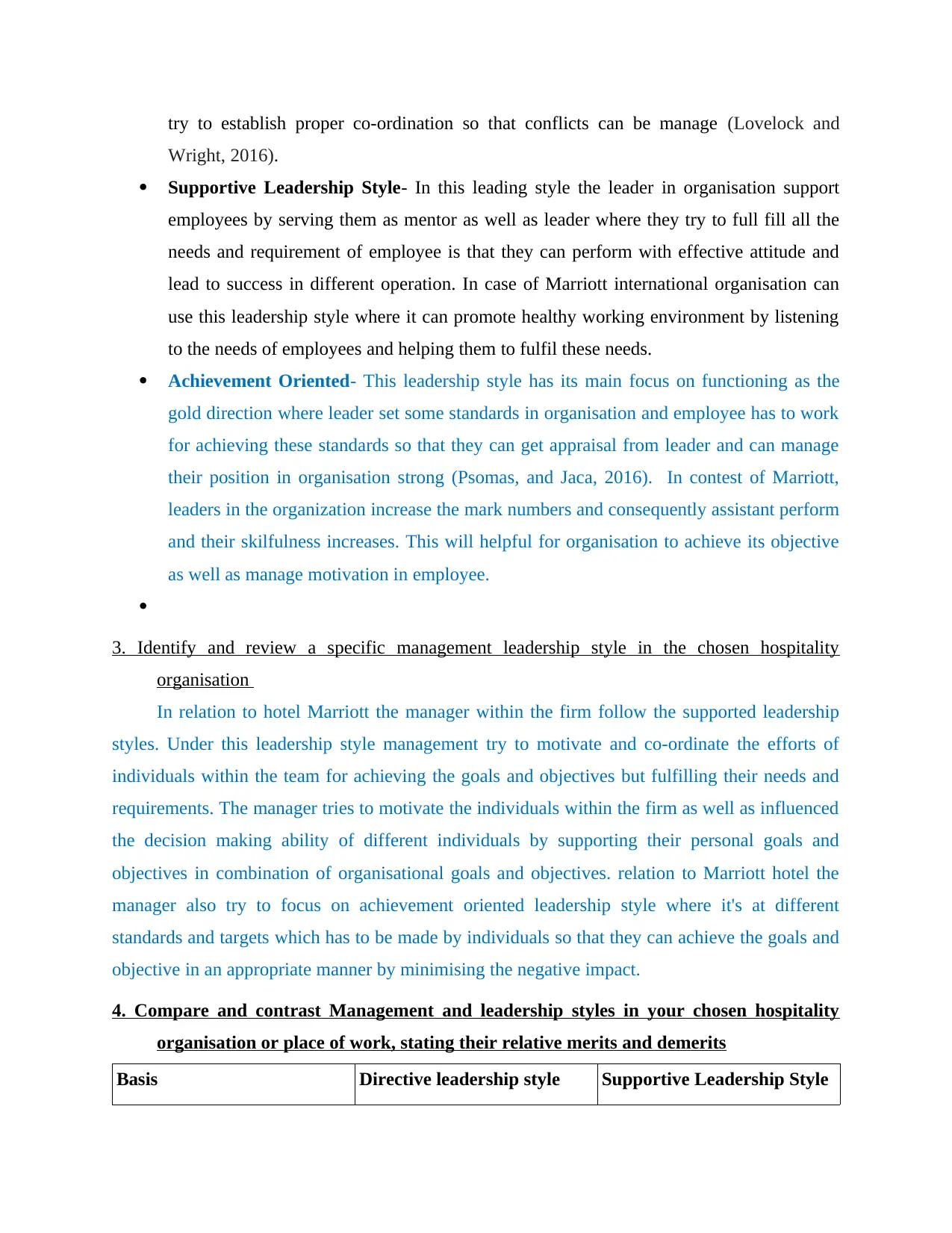
try to establish proper co-ordination so that conflicts can be manage (Lovelock and
Wright, 2016).
Supportive Leadership Style- In this leading style the leader in organisation support
employees by serving them as mentor as well as leader where they try to full fill all the
needs and requirement of employee is that they can perform with effective attitude and
lead to success in different operation. In case of Marriott international organisation can
use this leadership style where it can promote healthy working environment by listening
to the needs of employees and helping them to fulfil these needs.
Achievement Oriented- This leadership style has its main focus on functioning as the
gold direction where leader set some standards in organisation and employee has to work
for achieving these standards so that they can get appraisal from leader and can manage
their position in organisation strong (Psomas, and Jaca, 2016). In contest of Marriott,
leaders in the organization increase the mark numbers and consequently assistant perform
and their skilfulness increases. This will helpful for organisation to achieve its objective
as well as manage motivation in employee.
3. Identify and review a specific management leadership style in the chosen hospitality
organisation
In relation to hotel Marriott the manager within the firm follow the supported leadership
styles. Under this leadership style management try to motivate and co-ordinate the efforts of
individuals within the team for achieving the goals and objectives but fulfilling their needs and
requirements. The manager tries to motivate the individuals within the firm as well as influenced
the decision making ability of different individuals by supporting their personal goals and
objectives in combination of organisational goals and objectives. relation to Marriott hotel the
manager also try to focus on achievement oriented leadership style where it's at different
standards and targets which has to be made by individuals so that they can achieve the goals and
objective in an appropriate manner by minimising the negative impact.
4. Compare and contrast Management and leadership styles in your chosen hospitality
organisation or place of work, stating their relative merits and demerits
Basis Directive leadership style Supportive Leadership Style
Wright, 2016).
Supportive Leadership Style- In this leading style the leader in organisation support
employees by serving them as mentor as well as leader where they try to full fill all the
needs and requirement of employee is that they can perform with effective attitude and
lead to success in different operation. In case of Marriott international organisation can
use this leadership style where it can promote healthy working environment by listening
to the needs of employees and helping them to fulfil these needs.
Achievement Oriented- This leadership style has its main focus on functioning as the
gold direction where leader set some standards in organisation and employee has to work
for achieving these standards so that they can get appraisal from leader and can manage
their position in organisation strong (Psomas, and Jaca, 2016). In contest of Marriott,
leaders in the organization increase the mark numbers and consequently assistant perform
and their skilfulness increases. This will helpful for organisation to achieve its objective
as well as manage motivation in employee.
3. Identify and review a specific management leadership style in the chosen hospitality
organisation
In relation to hotel Marriott the manager within the firm follow the supported leadership
styles. Under this leadership style management try to motivate and co-ordinate the efforts of
individuals within the team for achieving the goals and objectives but fulfilling their needs and
requirements. The manager tries to motivate the individuals within the firm as well as influenced
the decision making ability of different individuals by supporting their personal goals and
objectives in combination of organisational goals and objectives. relation to Marriott hotel the
manager also try to focus on achievement oriented leadership style where it's at different
standards and targets which has to be made by individuals so that they can achieve the goals and
objective in an appropriate manner by minimising the negative impact.
4. Compare and contrast Management and leadership styles in your chosen hospitality
organisation or place of work, stating their relative merits and demerits
Basis Directive leadership style Supportive Leadership Style
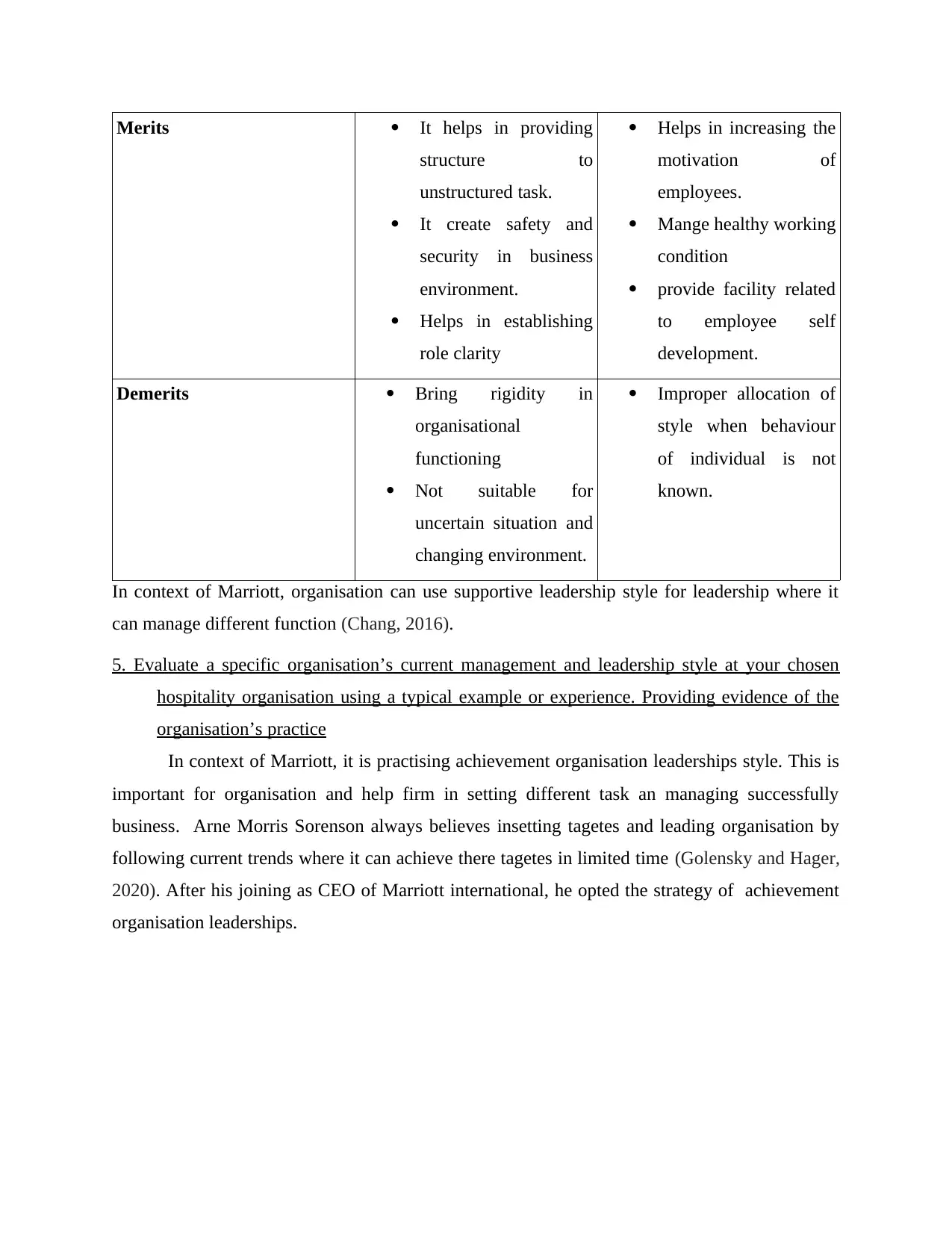
Merits It helps in providing
structure to
unstructured task.
It create safety and
security in business
environment.
Helps in establishing
role clarity
Helps in increasing the
motivation of
employees.
Mange healthy working
condition
provide facility related
to employee self
development.
Demerits Bring rigidity in
organisational
functioning
Not suitable for
uncertain situation and
changing environment.
Improper allocation of
style when behaviour
of individual is not
known.
In context of Marriott, organisation can use supportive leadership style for leadership where it
can manage different function (Chang, 2016).
5. Evaluate a specific organisation’s current management and leadership style at your chosen
hospitality organisation using a typical example or experience. Providing evidence of the
organisation’s practice
In context of Marriott, it is practising achievement organisation leaderships style. This is
important for organisation and help firm in setting different task an managing successfully
business. Arne Morris Sorenson always believes insetting tagetes and leading organisation by
following current trends where it can achieve there tagetes in limited time (Golensky and Hager,
2020). After his joining as CEO of Marriott international, he opted the strategy of achievement
organisation leaderships.
structure to
unstructured task.
It create safety and
security in business
environment.
Helps in establishing
role clarity
Helps in increasing the
motivation of
employees.
Mange healthy working
condition
provide facility related
to employee self
development.
Demerits Bring rigidity in
organisational
functioning
Not suitable for
uncertain situation and
changing environment.
Improper allocation of
style when behaviour
of individual is not
known.
In context of Marriott, organisation can use supportive leadership style for leadership where it
can manage different function (Chang, 2016).
5. Evaluate a specific organisation’s current management and leadership style at your chosen
hospitality organisation using a typical example or experience. Providing evidence of the
organisation’s practice
In context of Marriott, it is practising achievement organisation leaderships style. This is
important for organisation and help firm in setting different task an managing successfully
business. Arne Morris Sorenson always believes insetting tagetes and leading organisation by
following current trends where it can achieve there tagetes in limited time (Golensky and Hager,
2020). After his joining as CEO of Marriott international, he opted the strategy of achievement
organisation leaderships.
Paraphrase This Document
Need a fresh take? Get an instant paraphrase of this document with our AI Paraphraser
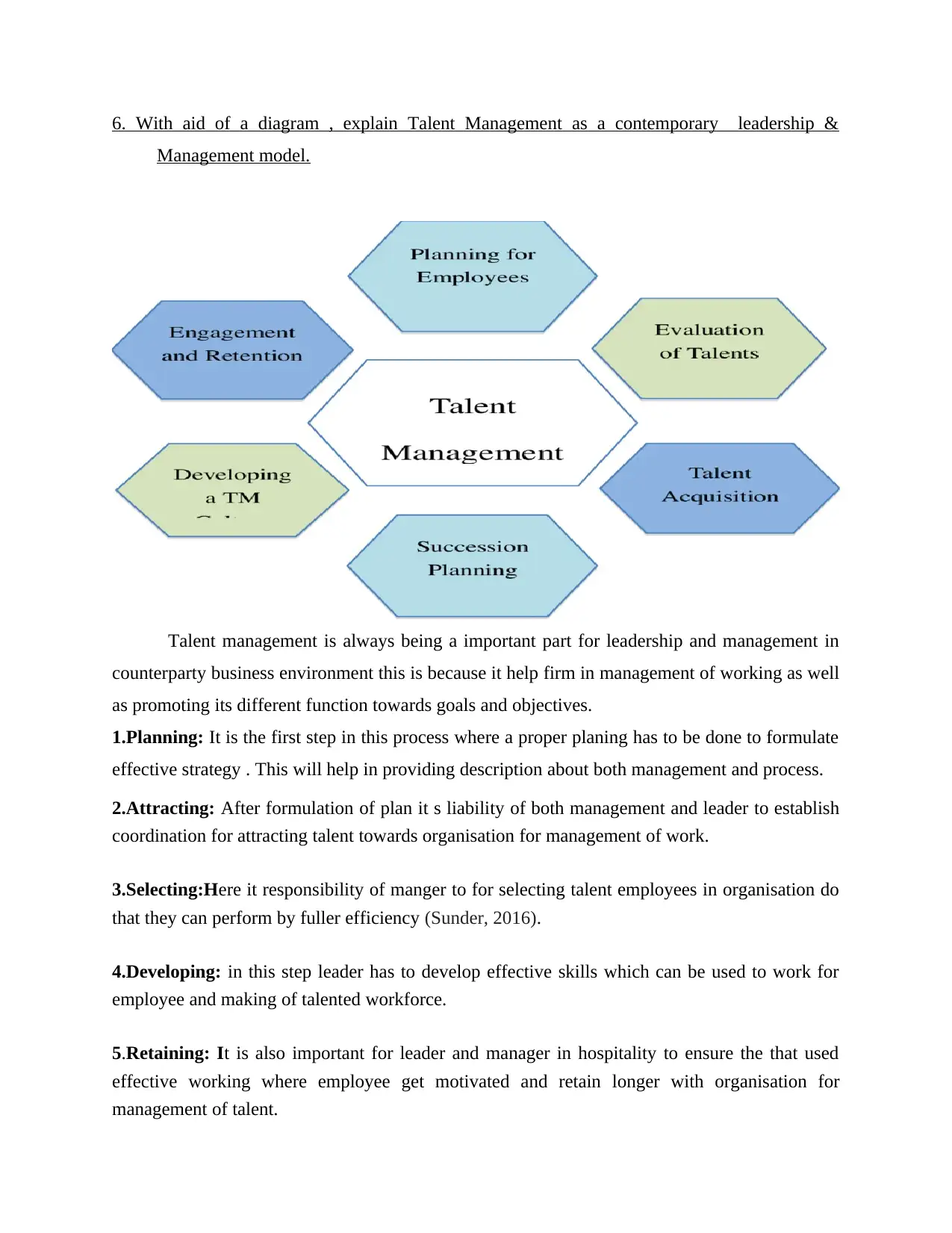
6. With aid of a diagram , explain Talent Management as a contemporary leadership &
Management model.
Talent management is always being a important part for leadership and management in
counterparty business environment this is because it help firm in management of working as well
as promoting its different function towards goals and objectives.
1.Planning: It is the first step in this process where a proper planing has to be done to formulate
effective strategy . This will help in providing description about both management and process.
2.Attracting: After formulation of plan it s liability of both management and leader to establish
coordination for attracting talent towards organisation for management of work.
3.Selecting:Here it responsibility of manger to for selecting talent employees in organisation do
that they can perform by fuller efficiency (Sunder, 2016).
4.Developing: in this step leader has to develop effective skills which can be used to work for
employee and making of talented workforce.
5.Retaining: It is also important for leader and manager in hospitality to ensure the that used
effective working where employee get motivated and retain longer with organisation for
management of talent.
Management model.
Talent management is always being a important part for leadership and management in
counterparty business environment this is because it help firm in management of working as well
as promoting its different function towards goals and objectives.
1.Planning: It is the first step in this process where a proper planing has to be done to formulate
effective strategy . This will help in providing description about both management and process.
2.Attracting: After formulation of plan it s liability of both management and leader to establish
coordination for attracting talent towards organisation for management of work.
3.Selecting:Here it responsibility of manger to for selecting talent employees in organisation do
that they can perform by fuller efficiency (Sunder, 2016).
4.Developing: in this step leader has to develop effective skills which can be used to work for
employee and making of talented workforce.
5.Retaining: It is also important for leader and manager in hospitality to ensure the that used
effective working where employee get motivated and retain longer with organisation for
management of talent.
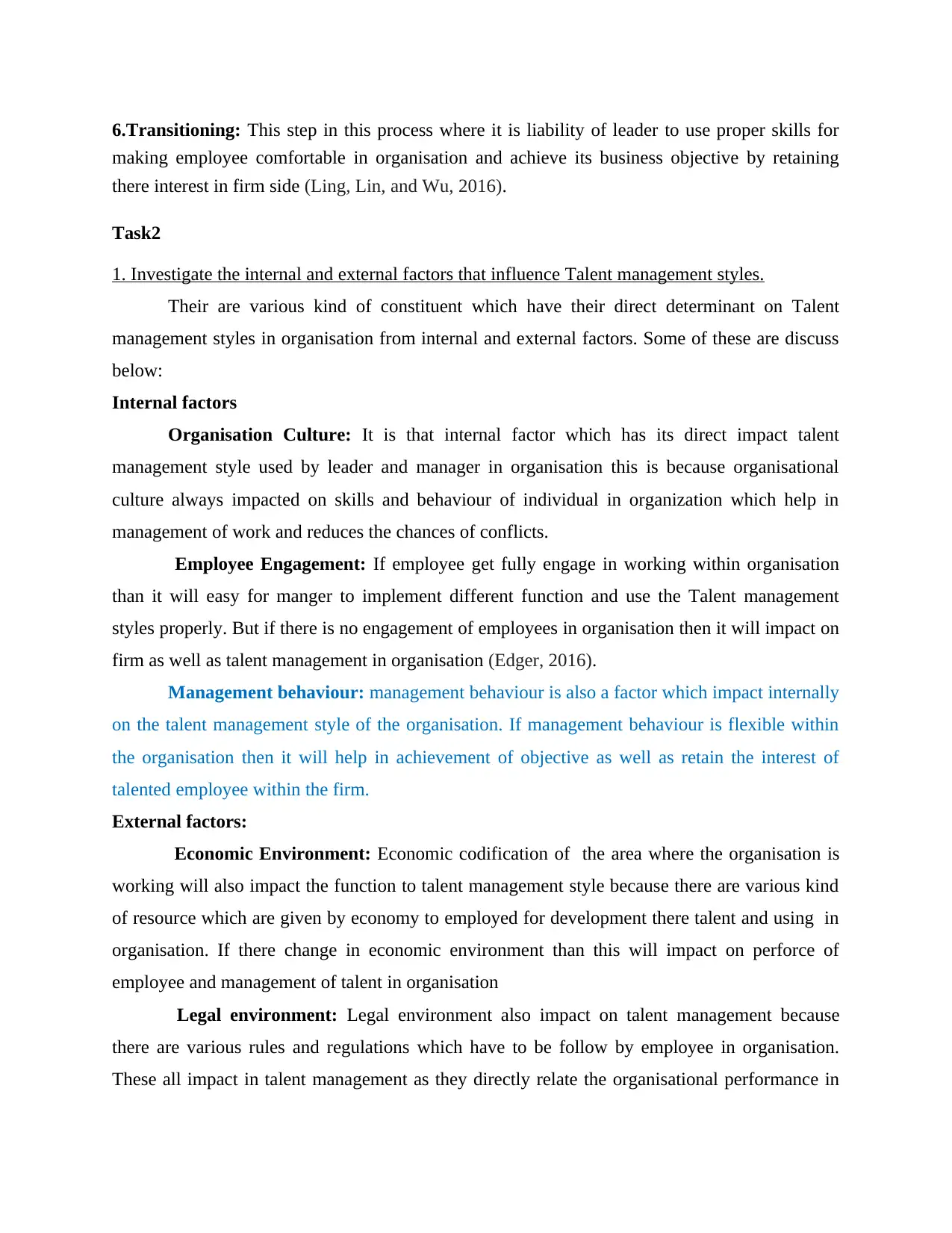
6.Transitioning: This step in this process where it is liability of leader to use proper skills for
making employee comfortable in organisation and achieve its business objective by retaining
there interest in firm side (Ling, Lin, and Wu, 2016).
Task2
1. Investigate the internal and external factors that influence Talent management styles.
Their are various kind of constituent which have their direct determinant on Talent
management styles in organisation from internal and external factors. Some of these are discuss
below:
Internal factors
Organisation Culture: It is that internal factor which has its direct impact talent
management style used by leader and manager in organisation this is because organisational
culture always impacted on skills and behaviour of individual in organization which help in
management of work and reduces the chances of conflicts.
Employee Engagement: If employee get fully engage in working within organisation
than it will easy for manger to implement different function and use the Talent management
styles properly. But if there is no engagement of employees in organisation then it will impact on
firm as well as talent management in organisation (Edger, 2016).
Management behaviour: management behaviour is also a factor which impact internally
on the talent management style of the organisation. If management behaviour is flexible within
the organisation then it will help in achievement of objective as well as retain the interest of
talented employee within the firm.
External factors:
Economic Environment: Economic codification of the area where the organisation is
working will also impact the function to talent management style because there are various kind
of resource which are given by economy to employed for development there talent and using in
organisation. If there change in economic environment than this will impact on perforce of
employee and management of talent in organisation
Legal environment: Legal environment also impact on talent management because
there are various rules and regulations which have to be follow by employee in organisation.
These all impact in talent management as they directly relate the organisational performance in
making employee comfortable in organisation and achieve its business objective by retaining
there interest in firm side (Ling, Lin, and Wu, 2016).
Task2
1. Investigate the internal and external factors that influence Talent management styles.
Their are various kind of constituent which have their direct determinant on Talent
management styles in organisation from internal and external factors. Some of these are discuss
below:
Internal factors
Organisation Culture: It is that internal factor which has its direct impact talent
management style used by leader and manager in organisation this is because organisational
culture always impacted on skills and behaviour of individual in organization which help in
management of work and reduces the chances of conflicts.
Employee Engagement: If employee get fully engage in working within organisation
than it will easy for manger to implement different function and use the Talent management
styles properly. But if there is no engagement of employees in organisation then it will impact on
firm as well as talent management in organisation (Edger, 2016).
Management behaviour: management behaviour is also a factor which impact internally
on the talent management style of the organisation. If management behaviour is flexible within
the organisation then it will help in achievement of objective as well as retain the interest of
talented employee within the firm.
External factors:
Economic Environment: Economic codification of the area where the organisation is
working will also impact the function to talent management style because there are various kind
of resource which are given by economy to employed for development there talent and using in
organisation. If there change in economic environment than this will impact on perforce of
employee and management of talent in organisation
Legal environment: Legal environment also impact on talent management because
there are various rules and regulations which have to be follow by employee in organisation.
These all impact in talent management as they directly relate the organisational performance in
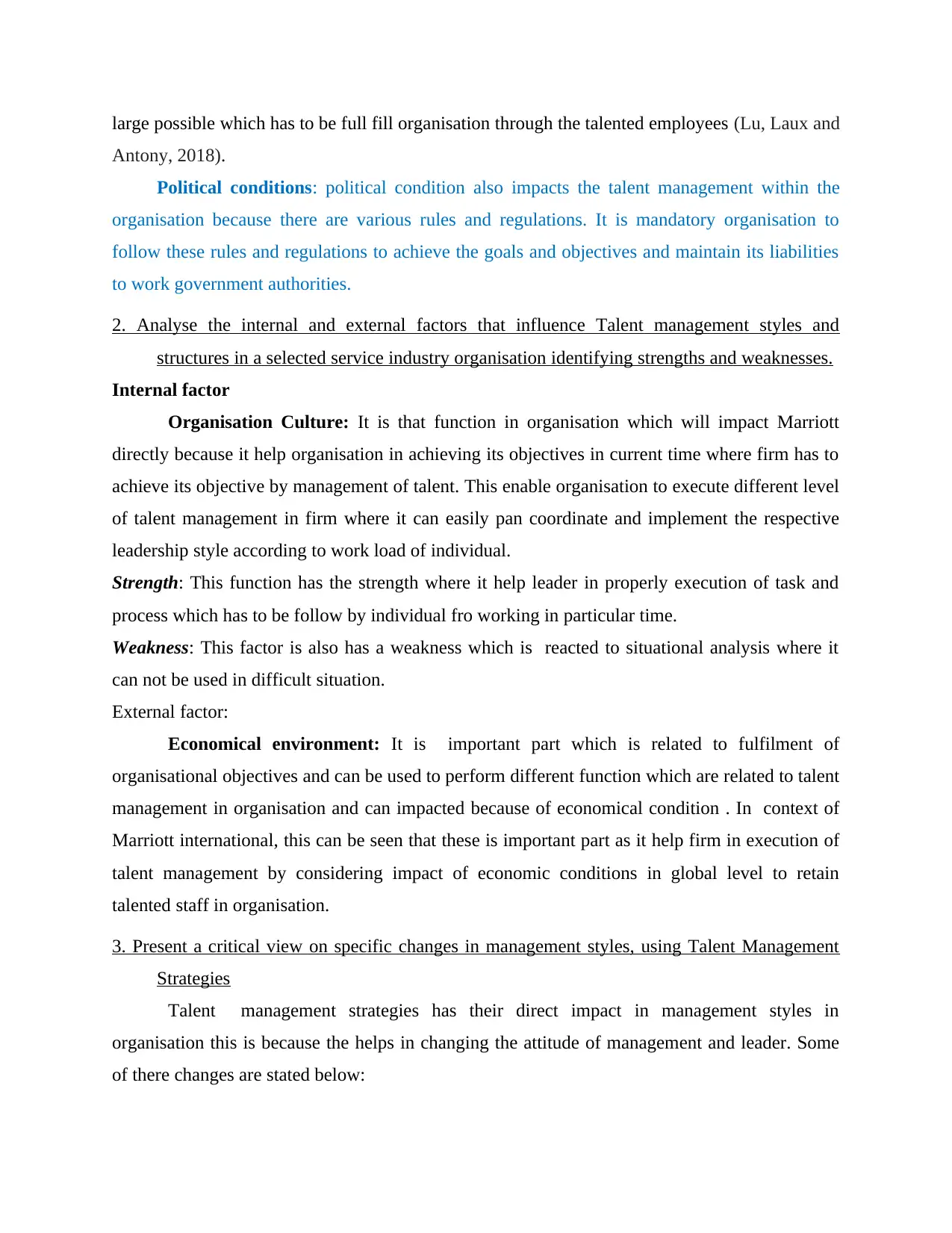
large possible which has to be full fill organisation through the talented employees (Lu, Laux and
Antony, 2018).
Political conditions: political condition also impacts the talent management within the
organisation because there are various rules and regulations. It is mandatory organisation to
follow these rules and regulations to achieve the goals and objectives and maintain its liabilities
to work government authorities.
2. Analyse the internal and external factors that influence Talent management styles and
structures in a selected service industry organisation identifying strengths and weaknesses.
Internal factor
Organisation Culture: It is that function in organisation which will impact Marriott
directly because it help organisation in achieving its objectives in current time where firm has to
achieve its objective by management of talent. This enable organisation to execute different level
of talent management in firm where it can easily pan coordinate and implement the respective
leadership style according to work load of individual.
Strength: This function has the strength where it help leader in properly execution of task and
process which has to be follow by individual fro working in particular time.
Weakness: This factor is also has a weakness which is reacted to situational analysis where it
can not be used in difficult situation.
External factor:
Economical environment: It is important part which is related to fulfilment of
organisational objectives and can be used to perform different function which are related to talent
management in organisation and can impacted because of economical condition . In context of
Marriott international, this can be seen that these is important part as it help firm in execution of
talent management by considering impact of economic conditions in global level to retain
talented staff in organisation.
3. Present a critical view on specific changes in management styles, using Talent Management
Strategies
Talent management strategies has their direct impact in management styles in
organisation this is because the helps in changing the attitude of management and leader. Some
of there changes are stated below:
Antony, 2018).
Political conditions: political condition also impacts the talent management within the
organisation because there are various rules and regulations. It is mandatory organisation to
follow these rules and regulations to achieve the goals and objectives and maintain its liabilities
to work government authorities.
2. Analyse the internal and external factors that influence Talent management styles and
structures in a selected service industry organisation identifying strengths and weaknesses.
Internal factor
Organisation Culture: It is that function in organisation which will impact Marriott
directly because it help organisation in achieving its objectives in current time where firm has to
achieve its objective by management of talent. This enable organisation to execute different level
of talent management in firm where it can easily pan coordinate and implement the respective
leadership style according to work load of individual.
Strength: This function has the strength where it help leader in properly execution of task and
process which has to be follow by individual fro working in particular time.
Weakness: This factor is also has a weakness which is reacted to situational analysis where it
can not be used in difficult situation.
External factor:
Economical environment: It is important part which is related to fulfilment of
organisational objectives and can be used to perform different function which are related to talent
management in organisation and can impacted because of economical condition . In context of
Marriott international, this can be seen that these is important part as it help firm in execution of
talent management by considering impact of economic conditions in global level to retain
talented staff in organisation.
3. Present a critical view on specific changes in management styles, using Talent Management
Strategies
Talent management strategies has their direct impact in management styles in
organisation this is because the helps in changing the attitude of management and leader. Some
of there changes are stated below:
Secure Best Marks with AI Grader
Need help grading? Try our AI Grader for instant feedback on your assignments.
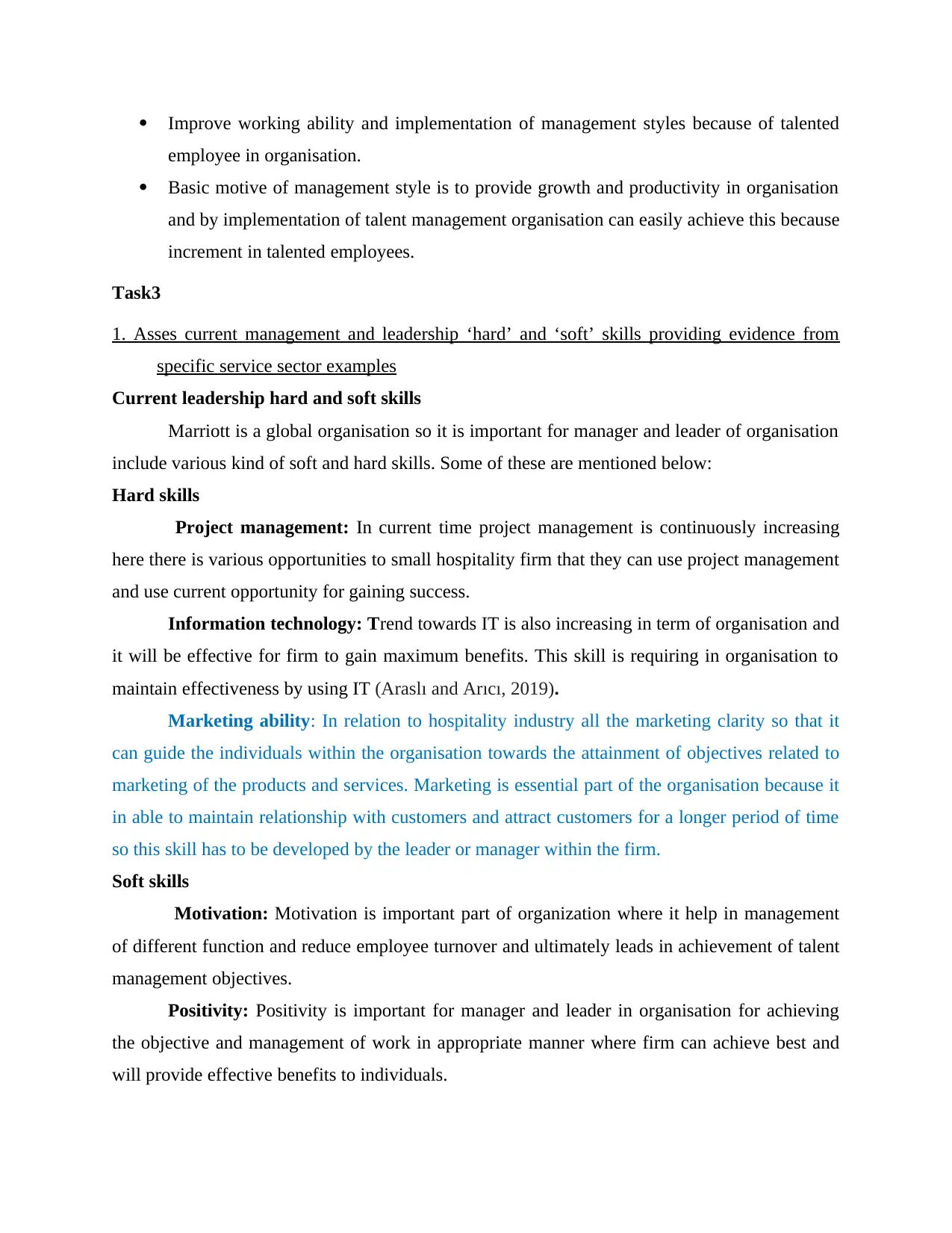
Improve working ability and implementation of management styles because of talented
employee in organisation.
Basic motive of management style is to provide growth and productivity in organisation
and by implementation of talent management organisation can easily achieve this because
increment in talented employees.
Task3
1. Asses current management and leadership ‘hard’ and ‘soft’ skills providing evidence from
specific service sector examples
Current leadership hard and soft skills
Marriott is a global organisation so it is important for manager and leader of organisation
include various kind of soft and hard skills. Some of these are mentioned below:
Hard skills
Project management: In current time project management is continuously increasing
here there is various opportunities to small hospitality firm that they can use project management
and use current opportunity for gaining success.
Information technology: Trend towards IT is also increasing in term of organisation and
it will be effective for firm to gain maximum benefits. This skill is requiring in organisation to
maintain effectiveness by using IT (Araslı and Arıcı, 2019).
Marketing ability: In relation to hospitality industry all the marketing clarity so that it
can guide the individuals within the organisation towards the attainment of objectives related to
marketing of the products and services. Marketing is essential part of the organisation because it
in able to maintain relationship with customers and attract customers for a longer period of time
so this skill has to be developed by the leader or manager within the firm.
Soft skills
Motivation: Motivation is important part of organization where it help in management
of different function and reduce employee turnover and ultimately leads in achievement of talent
management objectives.
Positivity: Positivity is important for manager and leader in organisation for achieving
the objective and management of work in appropriate manner where firm can achieve best and
will provide effective benefits to individuals.
employee in organisation.
Basic motive of management style is to provide growth and productivity in organisation
and by implementation of talent management organisation can easily achieve this because
increment in talented employees.
Task3
1. Asses current management and leadership ‘hard’ and ‘soft’ skills providing evidence from
specific service sector examples
Current leadership hard and soft skills
Marriott is a global organisation so it is important for manager and leader of organisation
include various kind of soft and hard skills. Some of these are mentioned below:
Hard skills
Project management: In current time project management is continuously increasing
here there is various opportunities to small hospitality firm that they can use project management
and use current opportunity for gaining success.
Information technology: Trend towards IT is also increasing in term of organisation and
it will be effective for firm to gain maximum benefits. This skill is requiring in organisation to
maintain effectiveness by using IT (Araslı and Arıcı, 2019).
Marketing ability: In relation to hospitality industry all the marketing clarity so that it
can guide the individuals within the organisation towards the attainment of objectives related to
marketing of the products and services. Marketing is essential part of the organisation because it
in able to maintain relationship with customers and attract customers for a longer period of time
so this skill has to be developed by the leader or manager within the firm.
Soft skills
Motivation: Motivation is important part of organization where it help in management
of different function and reduce employee turnover and ultimately leads in achievement of talent
management objectives.
Positivity: Positivity is important for manager and leader in organisation for achieving
the objective and management of work in appropriate manner where firm can achieve best and
will provide effective benefits to individuals.
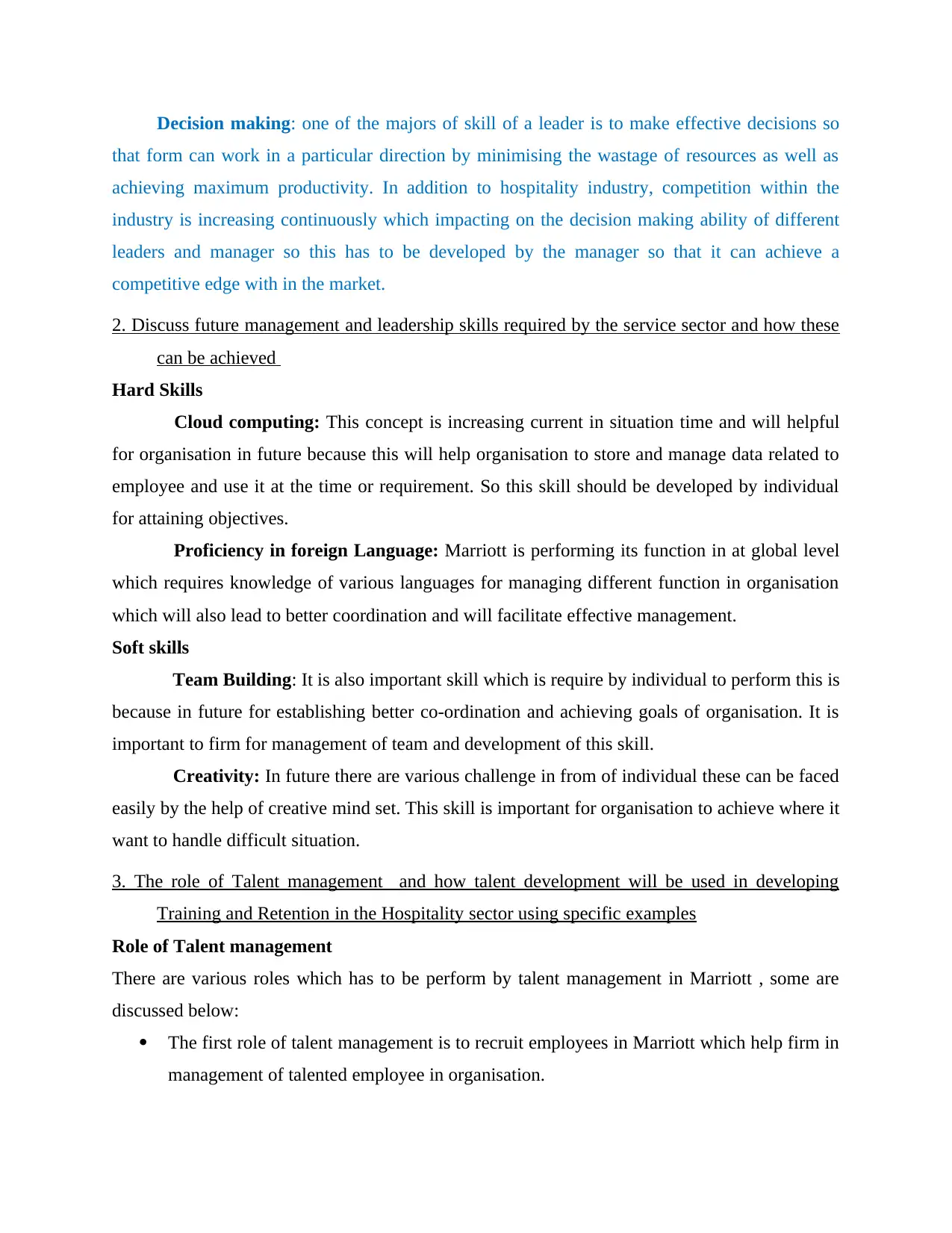
Decision making: one of the majors of skill of a leader is to make effective decisions so
that form can work in a particular direction by minimising the wastage of resources as well as
achieving maximum productivity. In addition to hospitality industry, competition within the
industry is increasing continuously which impacting on the decision making ability of different
leaders and manager so this has to be developed by the manager so that it can achieve a
competitive edge with in the market.
2. Discuss future management and leadership skills required by the service sector and how these
can be achieved
Hard Skills
Cloud computing: This concept is increasing current in situation time and will helpful
for organisation in future because this will help organisation to store and manage data related to
employee and use it at the time or requirement. So this skill should be developed by individual
for attaining objectives.
Proficiency in foreign Language: Marriott is performing its function in at global level
which requires knowledge of various languages for managing different function in organisation
which will also lead to better coordination and will facilitate effective management.
Soft skills
Team Building: It is also important skill which is require by individual to perform this is
because in future for establishing better co-ordination and achieving goals of organisation. It is
important to firm for management of team and development of this skill.
Creativity: In future there are various challenge in from of individual these can be faced
easily by the help of creative mind set. This skill is important for organisation to achieve where it
want to handle difficult situation.
3. The role of Talent management and how talent development will be used in developing
Training and Retention in the Hospitality sector using specific examples
Role of Talent management
There are various roles which has to be perform by talent management in Marriott , some are
discussed below:
The first role of talent management is to recruit employees in Marriott which help firm in
management of talented employee in organisation.
that form can work in a particular direction by minimising the wastage of resources as well as
achieving maximum productivity. In addition to hospitality industry, competition within the
industry is increasing continuously which impacting on the decision making ability of different
leaders and manager so this has to be developed by the manager so that it can achieve a
competitive edge with in the market.
2. Discuss future management and leadership skills required by the service sector and how these
can be achieved
Hard Skills
Cloud computing: This concept is increasing current in situation time and will helpful
for organisation in future because this will help organisation to store and manage data related to
employee and use it at the time or requirement. So this skill should be developed by individual
for attaining objectives.
Proficiency in foreign Language: Marriott is performing its function in at global level
which requires knowledge of various languages for managing different function in organisation
which will also lead to better coordination and will facilitate effective management.
Soft skills
Team Building: It is also important skill which is require by individual to perform this is
because in future for establishing better co-ordination and achieving goals of organisation. It is
important to firm for management of team and development of this skill.
Creativity: In future there are various challenge in from of individual these can be faced
easily by the help of creative mind set. This skill is important for organisation to achieve where it
want to handle difficult situation.
3. The role of Talent management and how talent development will be used in developing
Training and Retention in the Hospitality sector using specific examples
Role of Talent management
There are various roles which has to be perform by talent management in Marriott , some are
discussed below:
The first role of talent management is to recruit employees in Marriott which help firm in
management of talented employee in organisation.
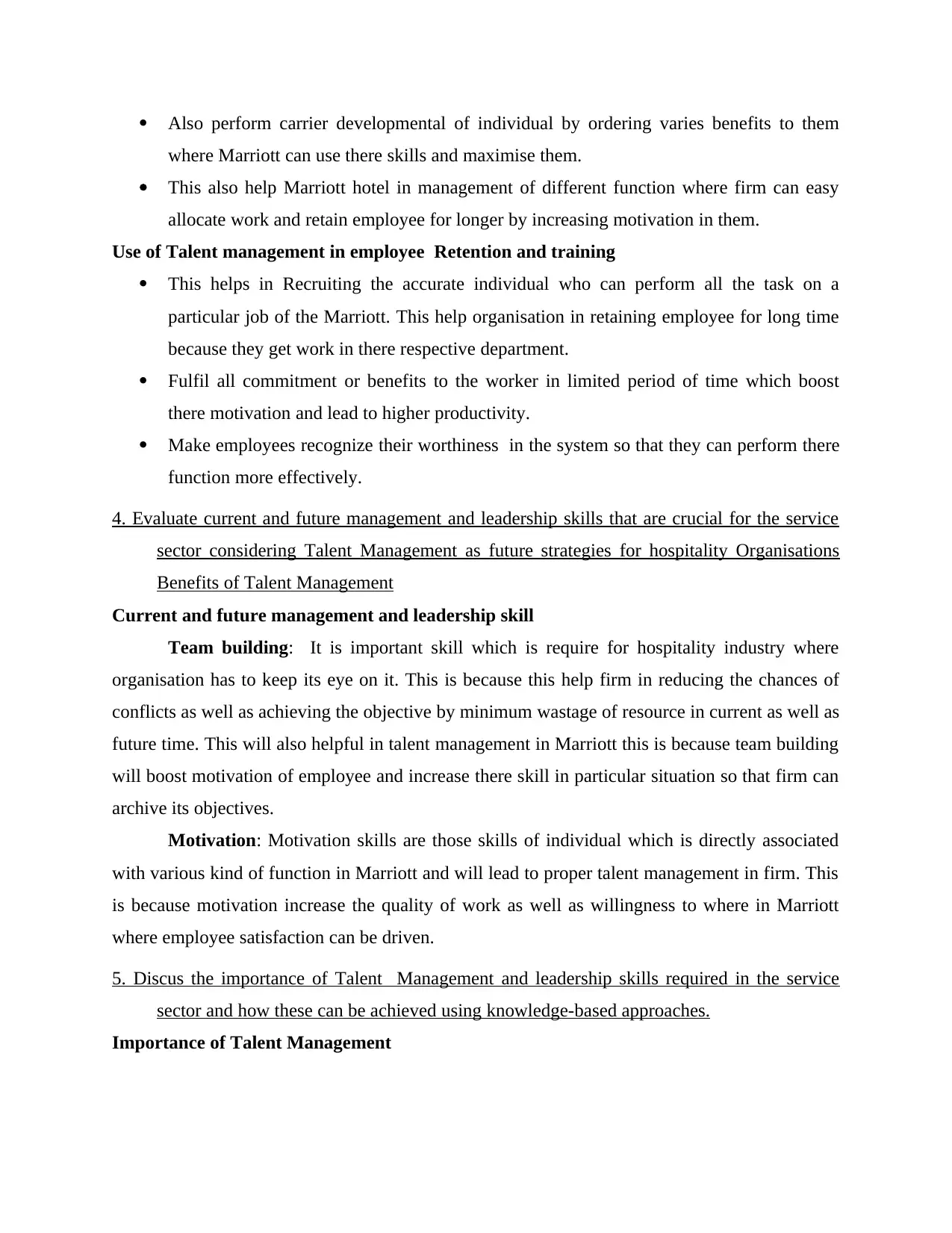
Also perform carrier developmental of individual by ordering varies benefits to them
where Marriott can use there skills and maximise them.
This also help Marriott hotel in management of different function where firm can easy
allocate work and retain employee for longer by increasing motivation in them.
Use of Talent management in employee Retention and training
This helps in Recruiting the accurate individual who can perform all the task on a
particular job of the Marriott. This help organisation in retaining employee for long time
because they get work in there respective department.
Fulfil all commitment or benefits to the worker in limited period of time which boost
there motivation and lead to higher productivity.
Make employees recognize their worthiness in the system so that they can perform there
function more effectively.
4. Evaluate current and future management and leadership skills that are crucial for the service
sector considering Talent Management as future strategies for hospitality Organisations
Benefits of Talent Management
Current and future management and leadership skill
Team building: It is important skill which is require for hospitality industry where
organisation has to keep its eye on it. This is because this help firm in reducing the chances of
conflicts as well as achieving the objective by minimum wastage of resource in current as well as
future time. This will also helpful in talent management in Marriott this is because team building
will boost motivation of employee and increase there skill in particular situation so that firm can
archive its objectives.
Motivation: Motivation skills are those skills of individual which is directly associated
with various kind of function in Marriott and will lead to proper talent management in firm. This
is because motivation increase the quality of work as well as willingness to where in Marriott
where employee satisfaction can be driven.
5. Discus the importance of Talent Management and leadership skills required in the service
sector and how these can be achieved using knowledge-based approaches.
Importance of Talent Management
where Marriott can use there skills and maximise them.
This also help Marriott hotel in management of different function where firm can easy
allocate work and retain employee for longer by increasing motivation in them.
Use of Talent management in employee Retention and training
This helps in Recruiting the accurate individual who can perform all the task on a
particular job of the Marriott. This help organisation in retaining employee for long time
because they get work in there respective department.
Fulfil all commitment or benefits to the worker in limited period of time which boost
there motivation and lead to higher productivity.
Make employees recognize their worthiness in the system so that they can perform there
function more effectively.
4. Evaluate current and future management and leadership skills that are crucial for the service
sector considering Talent Management as future strategies for hospitality Organisations
Benefits of Talent Management
Current and future management and leadership skill
Team building: It is important skill which is require for hospitality industry where
organisation has to keep its eye on it. This is because this help firm in reducing the chances of
conflicts as well as achieving the objective by minimum wastage of resource in current as well as
future time. This will also helpful in talent management in Marriott this is because team building
will boost motivation of employee and increase there skill in particular situation so that firm can
archive its objectives.
Motivation: Motivation skills are those skills of individual which is directly associated
with various kind of function in Marriott and will lead to proper talent management in firm. This
is because motivation increase the quality of work as well as willingness to where in Marriott
where employee satisfaction can be driven.
5. Discus the importance of Talent Management and leadership skills required in the service
sector and how these can be achieved using knowledge-based approaches.
Importance of Talent Management
Paraphrase This Document
Need a fresh take? Get an instant paraphrase of this document with our AI Paraphraser
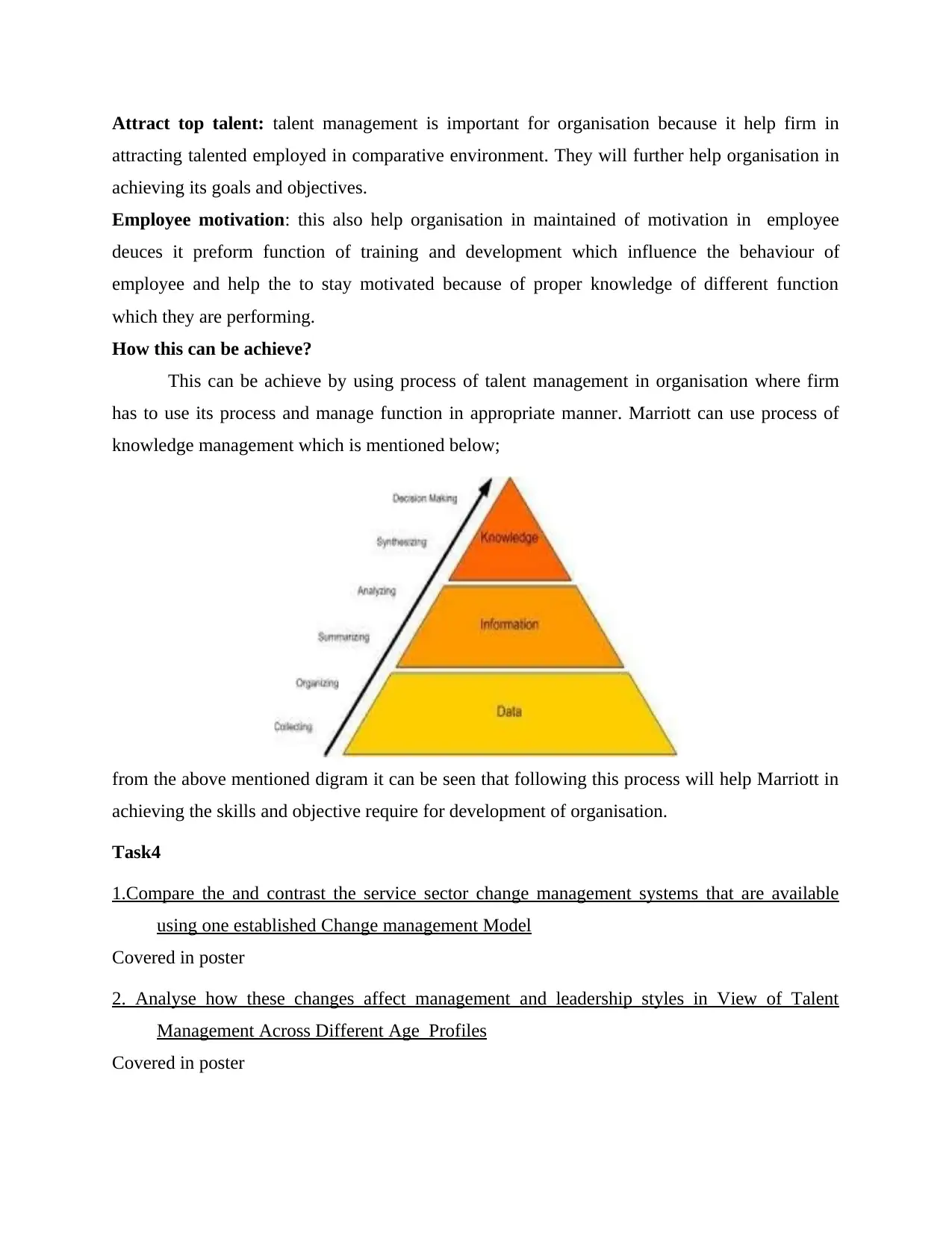
Attract top talent: talent management is important for organisation because it help firm in
attracting talented employed in comparative environment. They will further help organisation in
achieving its goals and objectives.
Employee motivation: this also help organisation in maintained of motivation in employee
deuces it preform function of training and development which influence the behaviour of
employee and help the to stay motivated because of proper knowledge of different function
which they are performing.
How this can be achieve?
This can be achieve by using process of talent management in organisation where firm
has to use its process and manage function in appropriate manner. Marriott can use process of
knowledge management which is mentioned below;
from the above mentioned digram it can be seen that following this process will help Marriott in
achieving the skills and objective require for development of organisation.
Task4
1.Compare the and contrast the service sector change management systems that are available
using one established Change management Model
Covered in poster
2. Analyse how these changes affect management and leadership styles in View of Talent
Management Across Different Age Profiles
Covered in poster
attracting talented employed in comparative environment. They will further help organisation in
achieving its goals and objectives.
Employee motivation: this also help organisation in maintained of motivation in employee
deuces it preform function of training and development which influence the behaviour of
employee and help the to stay motivated because of proper knowledge of different function
which they are performing.
How this can be achieve?
This can be achieve by using process of talent management in organisation where firm
has to use its process and manage function in appropriate manner. Marriott can use process of
knowledge management which is mentioned below;
from the above mentioned digram it can be seen that following this process will help Marriott in
achieving the skills and objective require for development of organisation.
Task4
1.Compare the and contrast the service sector change management systems that are available
using one established Change management Model
Covered in poster
2. Analyse how these changes affect management and leadership styles in View of Talent
Management Across Different Age Profiles
Covered in poster
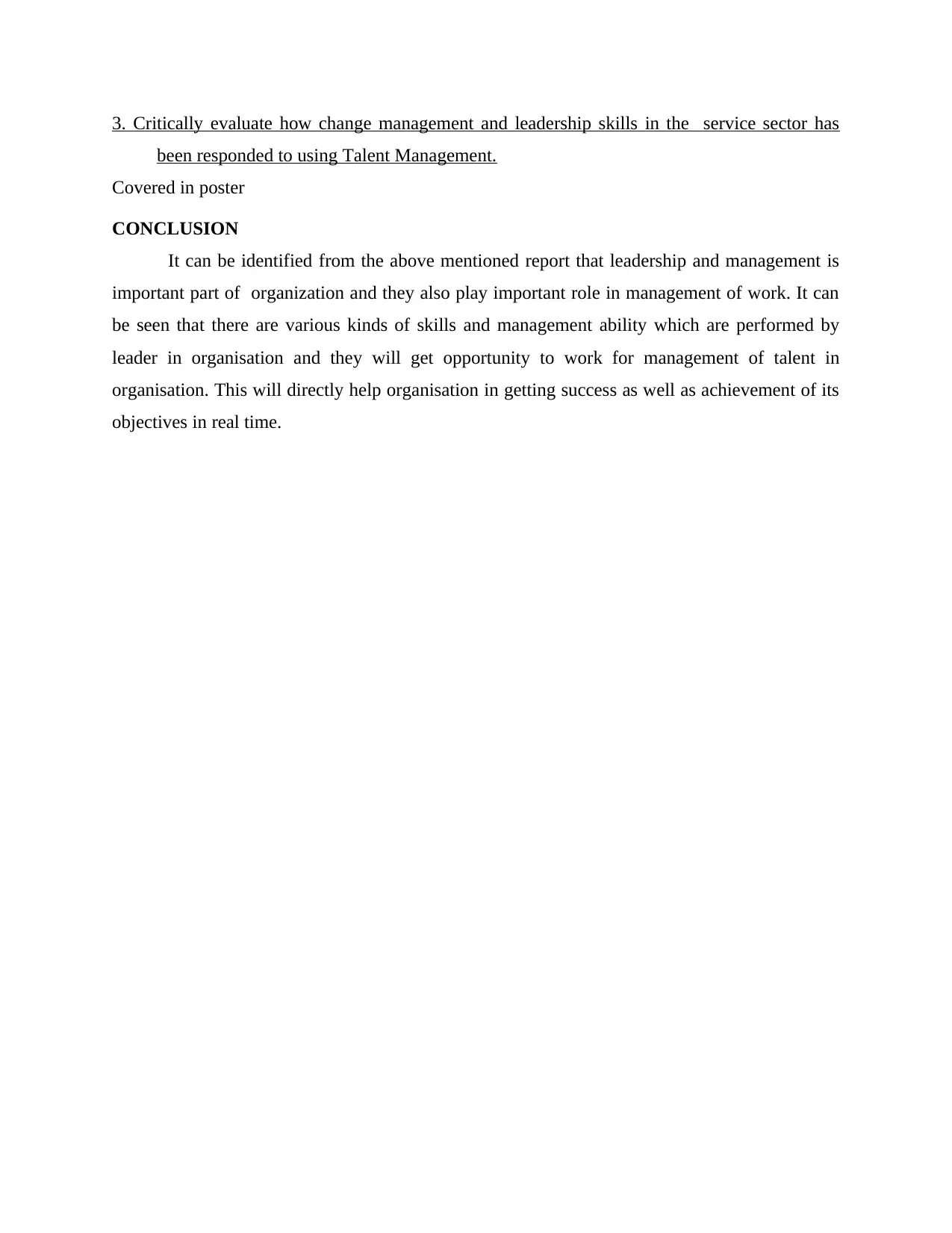
3. Critically evaluate how change management and leadership skills in the service sector has
been responded to using Talent Management.
Covered in poster
CONCLUSION
It can be identified from the above mentioned report that leadership and management is
important part of organization and they also play important role in management of work. It can
be seen that there are various kinds of skills and management ability which are performed by
leader in organisation and they will get opportunity to work for management of talent in
organisation. This will directly help organisation in getting success as well as achievement of its
objectives in real time.
been responded to using Talent Management.
Covered in poster
CONCLUSION
It can be identified from the above mentioned report that leadership and management is
important part of organization and they also play important role in management of work. It can
be seen that there are various kinds of skills and management ability which are performed by
leader in organisation and they will get opportunity to work for management of talent in
organisation. This will directly help organisation in getting success as well as achievement of its
objectives in real time.
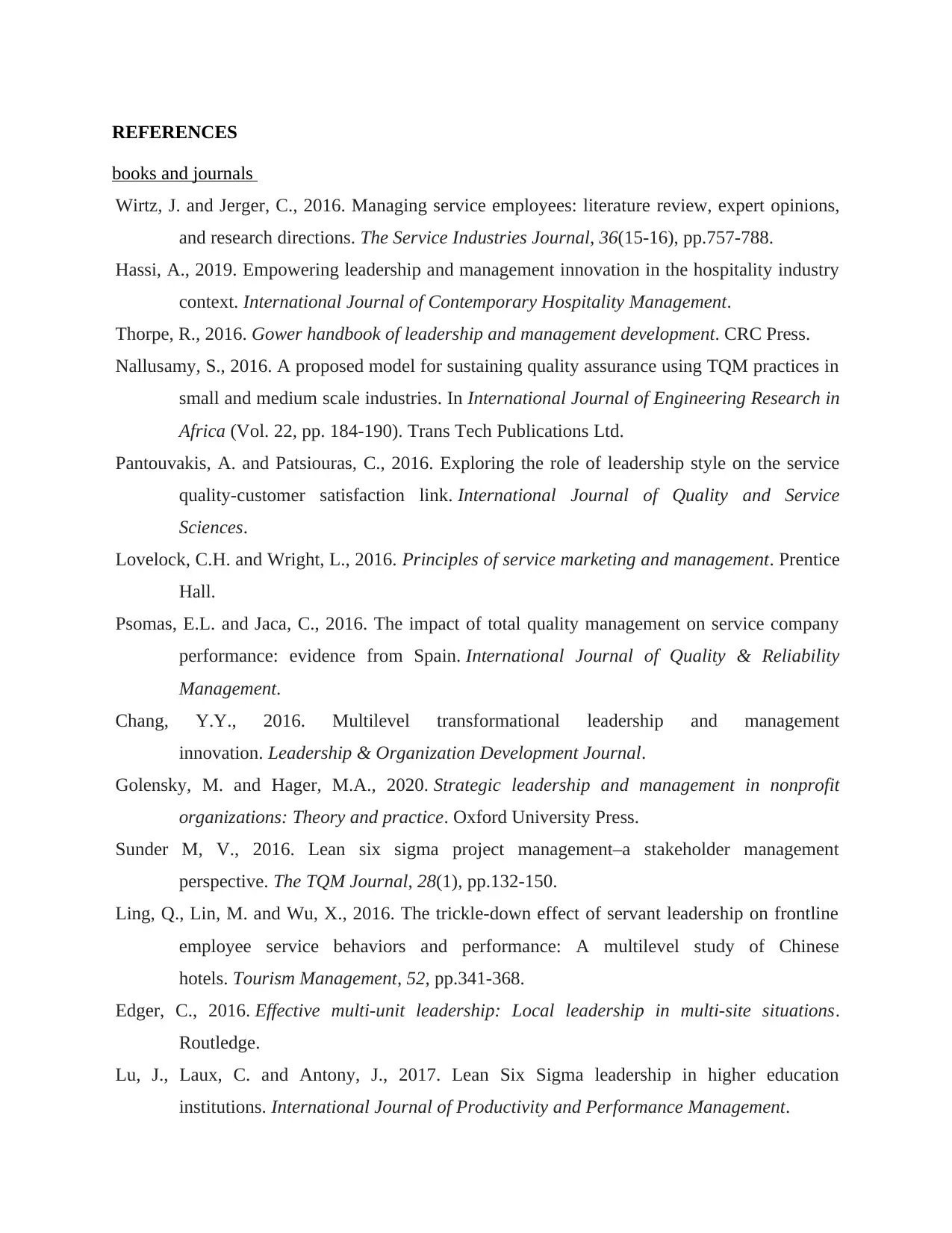
REFERENCES
books and journals
Wirtz, J. and Jerger, C., 2016. Managing service employees: literature review, expert opinions,
and research directions. The Service Industries Journal, 36(15-16), pp.757-788.
Hassi, A., 2019. Empowering leadership and management innovation in the hospitality industry
context. International Journal of Contemporary Hospitality Management.
Thorpe, R., 2016. Gower handbook of leadership and management development. CRC Press.
Nallusamy, S., 2016. A proposed model for sustaining quality assurance using TQM practices in
small and medium scale industries. In International Journal of Engineering Research in
Africa (Vol. 22, pp. 184-190). Trans Tech Publications Ltd.
Pantouvakis, A. and Patsiouras, C., 2016. Exploring the role of leadership style on the service
quality-customer satisfaction link. International Journal of Quality and Service
Sciences.
Lovelock, C.H. and Wright, L., 2016. Principles of service marketing and management. Prentice
Hall.
Psomas, E.L. and Jaca, C., 2016. The impact of total quality management on service company
performance: evidence from Spain. International Journal of Quality & Reliability
Management.
Chang, Y.Y., 2016. Multilevel transformational leadership and management
innovation. Leadership & Organization Development Journal.
Golensky, M. and Hager, M.A., 2020. Strategic leadership and management in nonprofit
organizations: Theory and practice. Oxford University Press.
Sunder M, V., 2016. Lean six sigma project management–a stakeholder management
perspective. The TQM Journal, 28(1), pp.132-150.
Ling, Q., Lin, M. and Wu, X., 2016. The trickle-down effect of servant leadership on frontline
employee service behaviors and performance: A multilevel study of Chinese
hotels. Tourism Management, 52, pp.341-368.
Edger, C., 2016. Effective multi-unit leadership: Local leadership in multi-site situations.
Routledge.
Lu, J., Laux, C. and Antony, J., 2017. Lean Six Sigma leadership in higher education
institutions. International Journal of Productivity and Performance Management.
books and journals
Wirtz, J. and Jerger, C., 2016. Managing service employees: literature review, expert opinions,
and research directions. The Service Industries Journal, 36(15-16), pp.757-788.
Hassi, A., 2019. Empowering leadership and management innovation in the hospitality industry
context. International Journal of Contemporary Hospitality Management.
Thorpe, R., 2016. Gower handbook of leadership and management development. CRC Press.
Nallusamy, S., 2016. A proposed model for sustaining quality assurance using TQM practices in
small and medium scale industries. In International Journal of Engineering Research in
Africa (Vol. 22, pp. 184-190). Trans Tech Publications Ltd.
Pantouvakis, A. and Patsiouras, C., 2016. Exploring the role of leadership style on the service
quality-customer satisfaction link. International Journal of Quality and Service
Sciences.
Lovelock, C.H. and Wright, L., 2016. Principles of service marketing and management. Prentice
Hall.
Psomas, E.L. and Jaca, C., 2016. The impact of total quality management on service company
performance: evidence from Spain. International Journal of Quality & Reliability
Management.
Chang, Y.Y., 2016. Multilevel transformational leadership and management
innovation. Leadership & Organization Development Journal.
Golensky, M. and Hager, M.A., 2020. Strategic leadership and management in nonprofit
organizations: Theory and practice. Oxford University Press.
Sunder M, V., 2016. Lean six sigma project management–a stakeholder management
perspective. The TQM Journal, 28(1), pp.132-150.
Ling, Q., Lin, M. and Wu, X., 2016. The trickle-down effect of servant leadership on frontline
employee service behaviors and performance: A multilevel study of Chinese
hotels. Tourism Management, 52, pp.341-368.
Edger, C., 2016. Effective multi-unit leadership: Local leadership in multi-site situations.
Routledge.
Lu, J., Laux, C. and Antony, J., 2017. Lean Six Sigma leadership in higher education
institutions. International Journal of Productivity and Performance Management.
Secure Best Marks with AI Grader
Need help grading? Try our AI Grader for instant feedback on your assignments.
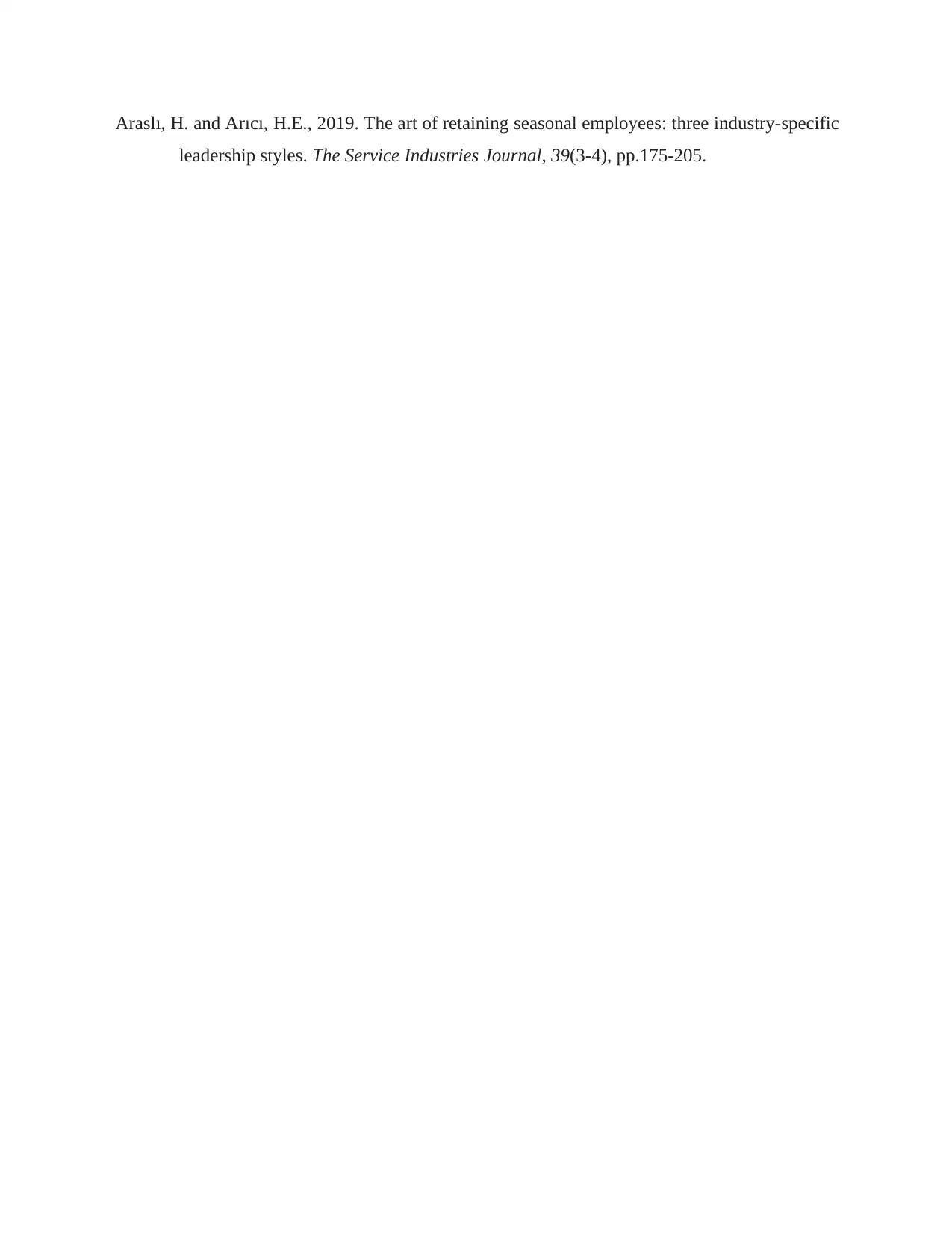
Araslı, H. and Arıcı, H.E., 2019. The art of retaining seasonal employees: three industry-specific
leadership styles. The Service Industries Journal, 39(3-4), pp.175-205.
leadership styles. The Service Industries Journal, 39(3-4), pp.175-205.
1 out of 17
Related Documents
Your All-in-One AI-Powered Toolkit for Academic Success.
+13062052269
info@desklib.com
Available 24*7 on WhatsApp / Email
![[object Object]](/_next/static/media/star-bottom.7253800d.svg)
Unlock your academic potential
© 2024 | Zucol Services PVT LTD | All rights reserved.





